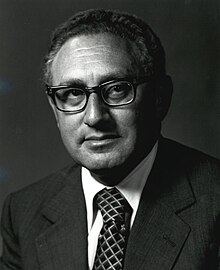Henry Kissinger
Henry Alfred Wolfgang Kissinger (born Heinz Alfred Wolfgang Kissinger; May 27, 1923 – November 29, 2023), pronounced /ˈkɪsɪndʒər/,[2] was a German-American political scientist, diplomat, and winner of the Nobel Peace Prize.[3] He served as both National Security Advisor and later as Secretary of State in the Nixon Administration and the Ford Administration.[3]
Henry Kissinger | |
|---|---|
 Official portrait, 1973 | |
| 56th United States Secretary of State | |
| In office September 22, 1973 – January 20, 1977 | |
| President | Richard Nixon Gerald Ford |
| Deputy | Kenneth Rush Robert Ingersoll Charles Robinson |
| Preceded by | William Rogers |
| Succeeded by | Cyrus Vance |
| United States National Security Advisor | |
| In office January 20, 1969 – November 3, 1975 | |
| President | Richard Nixon Gerald Ford |
| Preceded by | Walt Rostow |
| Succeeded by | Brent Scowcroft |
| 22nd Chancellor of The College of William & Mary | |
| In office February 10, 2001 – April 7, 2006 | |
| Preceded by | Margaret Thatcher |
| Succeeded by | Sandra Day O'Connor |
| Personal details | |
| Born | Heinz Alfred Kissinger May 27, 1923 Fürth, Bavaria, Germany[1] |
| Died | November 29, 2023 (aged 100) Kent, Connecticut, U.S. |
| Resting place | Arlington National Cemetery |
| Political party | Republican |
| Spouse(s) |
Ann Fleischer
(m. 1949; div. 1964) |
| Alma mater | City University of New York, City College Harvard University |
| Signature | |
| Military service | |
| Allegiance | |
| Branch/service | |
| Rank | Sergeant |
| Unit | 970th Counter Intelligence Corps |
Early life
changeKissinger was born in Germany in 1923. As a German Jew, it was not safe for him to stay in Germany after Adolf Hitler came to power, and he left for the United States in 1933. He fought for the US against the Nazis in World War II.
Nixon administration
changeKissinger was Richard Nixon's most trusted advisor on foreign affairs. He was in government during the Cold War and promoted what he called "realpolitik" in dealing with the Soviet Union and Communist China. He was a major force behind the 1973 ceasefire in the Vietnam War. Under Kissinger, the US opened up relations to China, which is considered one of his biggest successes. He also supported détente, an easing of the rivalry with the Soviets.
Nobel Prize
changeKissinger and Lê Đức Thọ were jointly offered the 1973 Nobel Peace Prize for their work on the Paris Peace Accords which lead to the withdrawal of American forces from the Vietnam War. Lê Đức Thọ declined to accept the award saying that peace had not actually been achieved in Vietnam.[4] Kissinger donated his prize money to charity, did not attend the award ceremony and later offered to return his prize medal after the fall of South Vietnam to North Vietnamese forces 18 months later.[5][6]
Later years
changeIn his later years, Kissinger — along with William Perry, Sam Nunn, and George Shultz — called upon governments to reduce nuclear weapons, and in three Wall Street Journal articles proposed a program of urgent steps to that end. The four have created the Nuclear Security Project to advance this cause.[7]
Kissinger died at the age of 100 on November 29, 2023, at his home in Kent, Connecticut.[8] The cause of death was congestive heart failure.[9]
Legacy
changeHis legacy is often debated by historians. Some people criticize him, even calling him a criminal, for his tactics during the Cold War, notably supporting a military junta in Chile and backing Pakistan during the Bangladesh War. Many people, however, consider Kissinger a great figure in modern American history who ended the Vietnam War, opened up China, and supported peace in the Cold War.
References
change- ↑ Isaacson, pp 20.
- ↑ "Definition of KISSINGER". www.merriam-webster.com.
- ↑ 3.0 3.1 "Ex-US Secretary of State Kissinger hospitalized". Retrieved 2010-03-13.[permanent dead link]
- ↑ Lewis, Flora (October 24, 1973). "Tho Rejects Nobel Prize, Citing Vietnam Situation". The New York Times. Archived from the original on January 1, 2011. Retrieved June 30, 2013.
- ↑ Dommen, Arthur (2002). The Indochinese Experience of the French and the Americans: Nationalism and Communism in Cambodia, Laos, and Vietnam. Indiana University Press. p. 878. ISBN 978-0-253-10925-5.
- ↑ Takeyh, Ray (June 13, 2016). "The Perils of Secret Diplomacy". The Weekly Standard. Archived from the original on September 11, 2018. Retrieved June 28, 2016.
- ↑ Maclin, Beth (2008-10-20) "A Nuclear weapon-free world is possible, Nunn says"[permanent dead link], Belfer Center, Harvard University. Retrieved on 2008-10-21.
- ↑ Pengelly, Martin (2023-11-30). "Henry Kissinger, secretary of state to Richard Nixon, dies at 100". The Guardian. ISSN 0261-3077. Retrieved 2023-11-30.
- ↑ Haskins, Caroline (January 12, 2024). "Henry Kissinger Cause of Death Revealed". Rolling Stone. Retrieved January 12, 2024.
Other websites
change- Annotated Bibliography for Henry Kissinger from the Alsos Digital Library for Nuclear Issues Archived 2016-04-27 at the Wayback Machine
- Official Website of Henry A. Kissinger
- Henry Kissinger on IMDb
- "Charlie Rose" Archived 2012-02-14 at the Wayback Machine A conversation with Henry Kissinger, December 16, 2008
- Henry Kissinger speaks at the Asia Society, NYC, February 2007 Archived 2009-02-24 at the Wayback Machine
- Kissinger's political donations Archived 2012-05-12 at the Wayback Machine
- NPR: Kissinger Speech at National Press Club Archived 2018-12-15 at the Wayback Machine. Towards the end [55:55], he responds to Hitchens.